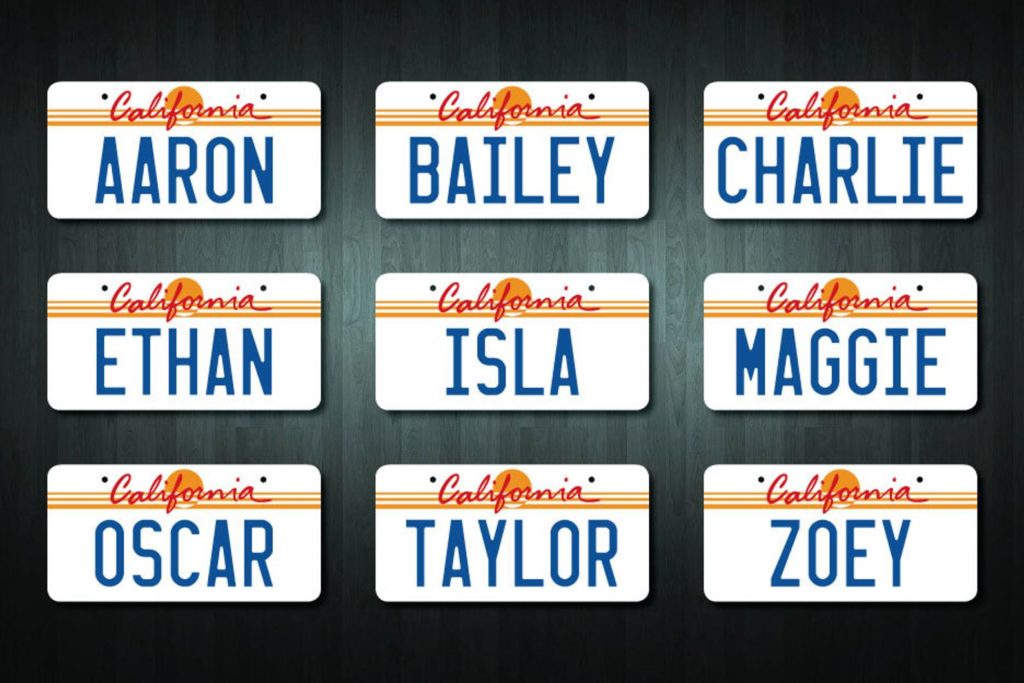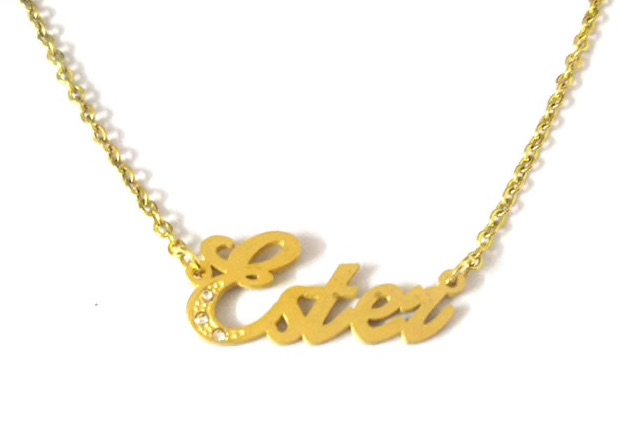Growing up in the 1980s, the golden age of the personalized souvenir, was a rough time to grow up with a name like Esther. Each time I was at a gift shop in the United States, roughly five times a year, I would approach the swiveling painted metal racks, with their tidy rows of four-letter American names embossed on key chains, magnets, and miniature vanity license plates, I would start as far as possible, then slowly turn the row of girl “e” names to face me, practically daring mine to be there. Emily…Emma…Erin…the odd Estelle, then right onto Faith. “Why did you name me an old lady name (nombre de abuelita)?” I’d ask my mom. “It was your great grandmother’s,” was always the response, and to my ensuing “viste! De abuelita!” she would chuckle and say, “pues, nisiquiera ella nació vieja.”
I grew into my first name just after adolescence, long before becoming a great grandmother, and even managed to find a couple of personalized knick-knacks along the years, none of which I bought because “Esther” was invariably spelled without the “h.” That “h,” which is as silent in my name as it is in my native tongue, is ironically and often left out of the Spanish spelling. In English, where one expects it to make a sound like in “hat” or in the case of its position in my name next to the “t,” a sound like in “they,” it appears almost like the ghost of other languages, the languages of my great grandparents.

My last name was a different conundrum, less so for me that for others. The name is arguably German, meaning “beloved man”, but it got to me via the Russian branch of my family, the ones who hailed from a town near Minsk. Our name arrived in Colombia in an actual boat, born by my grandfather León (Leibel) and his sister Elka. Given the port of embarkation, the travel documents were likely written in Cyrillic characters or loosely transliterated in order to be legible to the South American officials on the other end of the journey.
My dad and I took a guess, back when I was in 9th grade and I was assigned a family tree project (one that stirred up emotions in families like mine, in which a lot of information had been lost to pogroms, communal graves, and, for the lucky, exile), that its spelling was simplified and made phonetic in Spanish, each letter announcing its presence. “Liebermann” would become “L-i-b-e-r-m-a-n:” no “ie”, no double consonants. Anyone accustomed to spelling things in Spanish can get through it without a problem. But there’s no denying it is absolutely not a Spanish name.
Like most societies around the world, naming is a patriarchal endeavor, with children bearing some distinguishable mark of their father. The Russians give their babies a surname of “family name” as well as middle name or “patronymic,” which is essentially the father’s first name with the ending “-ovna” for a woman and “-ovich” for a man. In my grandfather’s hometown, I would have been Esther Morisovna Liberman, linking me to my lineage with every step of the way. In Scandinavia, the popular ending to surnames—sson, son, or sohn— means exactly what you think it does. The Petersons are the clan of Peter. In Hebrew, the format is “ben Last Name;” in Arabic “bin Last Name.”
In Spain, this same identifying marker is comprised by the ending “-ez,” so that the Fernandez family started as Fernando’s clan, Ramirez was Ramiro’s and so on. Not all, but many Latin last names carry this distinction. Others, like in any culture, are variations on Spanish words that describe a place of origin (“Dávila” for “De Avila”), an occupation (Márques), or even the description of an ancestor’s appearance (“Rubio” is “blond”). Mine, with its clearly foreign-sounding inflection is obviously not any of these.
How Much Does This Matter?
I will admit it didn’t very much when I was growing up, and primarily because any effort at getting me to spell it would result in me saying “como suena” and the speller would get it right. Also, having a thick skin about being different also helps. While it was perfectly obvious that my name wasn’t Colombian growing up, there was also no real problem with that in childhood. Most people could pronounce it and I don’t remember it ever being an issue.
Of course, mine wasn’t the only family with an unusual last name. As one of around 3000 families of Jewish immigrants, we were a tiny minority in Colombia. But we also weren’t the only immigrants. Latin America enjoyed various waves of immigration between the late 1800s and the first half of the 1900s, and these Middle Easterners and Europeans were largely well-received. Unlike in the United States, where immigrants were feared for changing the cultural makeup of the country, the majority of immigrants to Latin America were seen as a “whitening” force and were easily absorbed, together with their new-to-Spanish last names.
Among the most common waves were the Italians who arrived in Argentina and Uruguay, easily melding with the existing culture, bringing with them a culture of pasta and last names ending in double consonants and an “i”, amongst many other contributions to the culture. Surely, gauchos, parrillada, and tango are as Argentinean as having gnocchi on the 29th of the month and Miguelito Pitti, one of Mafalda’s best friends. Italians and Germans both emigrated to these southern South American countries, between and after the World Wars, and provided a lot of that coveted “whitening effect.”
Chinese immigrants arrived in Perú and later the Japanese who were fleeing their war back home against China also came in droves. These were more distant cultures, both in geography and content, and were not as homogenized as the Europeans. While they fared better in Brazil than Perú, where they were better embraced by the culture, their legacy is apparent in the cuisine, regional phenotypes, and in some Peruvian last names.
Middle Eastern immigrants also arrived in South America, many settling along the coasts and bringing their trades from home with them. Even in García Márquez’s Macondo the “gitanos y árabes” (gypsies and Arabs) are among the first to settle the magical town. In real life, there is a small but substantial Lebanese community in the Caribbean coast of Colombia, as well as Lebanese and Palestinian communities in México, Brazil, and many other places throughout the continent. Last names beginning with the letter “al” and other Arabic last names endure today.
The Melting Pot of Latin America
Thanks to all of these cultures’ colorful effects on the already complex local culture, Latin America has grown to accept itself as a sort of melting pot, much like the United States. But when it comes to last names, a foreign-sounding one is still notable. At the end of the day, in a continent where most of the nations were once Spanish colonies beholden to both the European monarchic lines and the Roman Catholic Church, the right kind of last name carries a lot of weight. A last name can place a family in politics or even within particular trades, as is common in conservative and traditionalist societies, like the Latin American ones. A foreign name does not make these high-power roads easier to travel.
What about the same phenomenon but here in the United States, amongst our Latino community? It is decidedly different to be in an English-speaking country where Latinos are still (marginally) a minority, and have one of these non-Latino sounding names? On paper, a name that doesn’t sound Latin can be attached to someone who might be in every other way — down to the accent of their spoken language — clearly so. While in Latin America, having ancestors from a different part of the world with non-Latin names might have a positive “whitening” effect, a peculiar one, or imply a level of exclusion from society. In the United States, the effect is somewhat different.
Socially speaking, people often fear they will be discriminated against based on their Latin last names. Of course, this is likely true in many instances, and one of the most worrisome iterations is the sense that a resume, on which we are required to disclose our name though not our heritage. On that front, there is good news. A recent study showed that in the employment world, all demographics of job-seekers are treated equally, regardless of whatever race or ethnicity could be inferred from their last name.
But no study can stop the uneasy feeling that the playing field is made lopsided by something we cannot control, like our inherited name. Latinas have particular power in their ability to change their Latin-sounding names to a non-Latin one, through marriage. While some of us keep our maiden names, other Latina who feel they have suffered discrimination due to their Latin-sounding family name, are ready to trade in a profound connection with their latinidad for their spouse’s English-sounding peace of mind. Similarly, Latinas who feel this way would choose the non-Latin name for their children, hoping to spare them additional difficulties.
Of course, values like family, identity, and latinidad are in no way bound up in a name. It is completely respectable to keep a Latin-sounding name as it is to adopt our spouse’s. Naturally, I am living proof that it is equally possible to be fully Latina and not have one of those Spanish-sounding names. In fact, it can be quite useful, especially in its spying applications (eavesdropping, knowing what is being said about me) as well as a fun party trick: the curly-haired girl who sounds like she’d be Jewish from New York speaks Spanish.
Leave it to me, though, to find perhaps one of the only professions in which it would have been so much better to have a Latin last name. When I finally graduated with my PhD and was ready to go on the job market, looking for a job in Comparative Literature (a withering field) or Spanish (a department still on the rise), I discussed my prospects with each of my three prodigal advisors, all Jewish immigrants with names that sound like my own.
The Argentinean one being most sympathetic to my plight: on my curriculum vitae it might appear unconvincing that I could ever be a Spanish professor. My name belied my origin, my background, my interests, my studies, and my mother tongue. “Wait a minute! You’re getting married soon!” my male Canadian advisor exclaimed. “Can’t you just take his name? What his name?” “Bakalarz,” I replied. “Bakalarz! Are you kidding me? How does that help us?”
After I got married, I opened bank accounts and renewed my license with an ironic “de” between my last name and my husband’s, a slight Spanish inflection with a send up of the upsettingly chauvinistic custom of describing a betrothed lady as being “of” her husband. I figured that in my Russian-German-Polish unwieldy mess of a name, a hiring committee might see my latinidad peeking through the tiny, little “de.” In the end, this bit of linguistic hallucination had no effect on an academic career I felt utterly ambivalent about, and once I had moved onto other projects, I wanted to change my name back to just plain Liberman.

I didn’t have to do much. As I found out during my citizenship interview, I had never legally changed it in the first place, just filled out a couple of forms with this new Frankenstein of a name. Once I was ready to go back to my non-Latin sounding last name, my original name, my father’s name and his father’s name, my spy name, my pen name, all I had to do was squeeze shut my eyes and erase the memory of that bizarre little “de.” The power had been in me all along.
For Image credit or remove please email for immediate removal - info@belatina.com







































